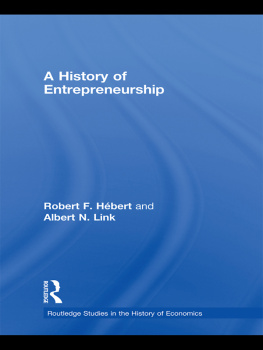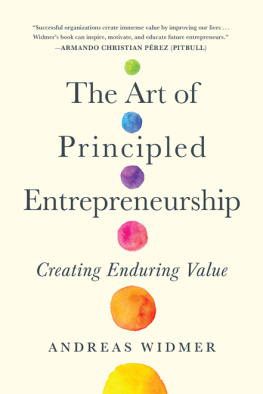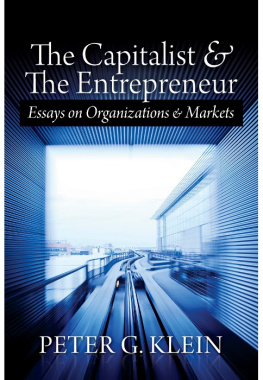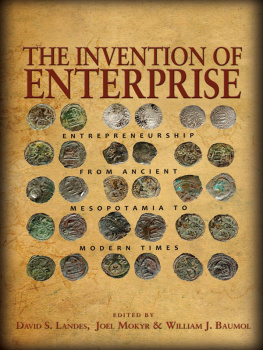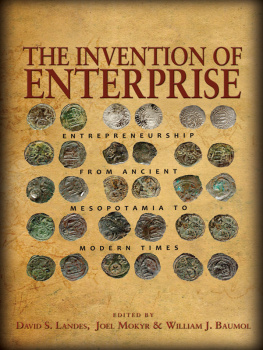This book establishes a chronological trace of the entrepreneur as treated in economic literature in order to give a more illuminating perspective to contemporary writings and teachings on entrepreneurship. It focuses on the nature and role of the entrepreneur and of entrepreneurship as revealed in economic literature as early as the eighteenth century, when Richard Cantillon first coined the term entrepreneur. The authors then trace how Joseph Schumpeters perspective, among others, on entrepreneurship came to dominate the worlds understanding of the term.
Due to Schumpeters dominant influence, entrepreneurship has come to occupy a primary role in the theory of economic development. In this book Hbert and Link discuss various key topics, including the German tradition, the Austrian and the English School of thought, and individuals such as Alfred Marshall and Jeremy Bentham. The historical survey also illustrates the tension that often exists between theory and practice and how it has been difficult for economic theory to assimilate a core concept that plays a vital role in social and economic change. Finally, the book exposes the many different facets of entrepreneurship as they have been perceived by some of the great economists throughout the ages.
This fascinating and insightful book will be of interest to students and researchers in the history of economic thought as well as thoughtful scholars of entrepreneurship everywhere.
Routledge Studies in the History of Economics
1 Economics as Literature
2 Socialism and Marginalism in Economics 18701930
3 Hayeks Political Economy
- The socio-economics of order
- Steve Fleetwood
4 On the Origins of Classical Economics
- Distribution and value from William Petty to Adam Smith
- Tony Aspromourgos
5 The Economics of Joan Robinson
- Edited by Maria Cristina Marcuzzo, Luigi Pasinetti, and Alesandro Roncaglia
6 The Evolutionist Economics of Lon Walras
7 Keynes and the Classics
- A study in language, epistemology and mistaken identities
- Michel Verdon
8 The History of Game Theory, Vol 1
- From the beginnings to 1945
- Robert W. Dimand and Mary Ann Dimand
9 The Economics of W. S. Jevons
10 Gandhis Economic Thought
11 Equilibrium and Economic Theory
- Edited by Giovanni Caravale
12 Austrian Economics in Debate
- Edited by Willem Keizer, Bert Tieben, and Rudy van Zijp
13 Ancient Economic Thought
14 The Political Economy of Social Credit and Guild Socialism
- Frances Hutchinson and Brian Burkitt
15 Economic Careers
- Economics and economists in Britain 19301970
- Keith Tribe
16 Understanding Classical Economics
- Studies in the Long-period Theory
- Heinz Kurz and Neri Salvadori
17 History of Environmental Economic Thought
18 Economic Thought in Communist and Post-Communist Europe
- Edited by Hans-Jrgen Wagener
19 Studies in the History of French Political Economy
- From Bodin to Walras
- Edited by Gilbert Faccarello
20 The Economics of John Rae
- Edited by O. F. Hamouda, C. Lee, and D. Mair
21 Keynes and the Neoclassical Synthesis
- Einsteinian versus Newtonian macroeconomics
- Teodoro Dario Togati
22 Historical Perspectives on Macroeconomics
- Sixty years after the General Theory
- Edited by Philippe Fontaine and Albert Jolink
23 The Founding of Institutional Economics
- The leisure class and sovereignty
- Edited by Warren J. Samuels
24 Evolution of Austrian Economics
- From Menger to Lachmann
- Sandye Gloria
25 Marxs Concept of Money
- The god of commodities
- Anitra Nelson
26 The Economics of James Steuart
- Edited by Ram n Tortajada
27 The Development of Economics in Europe since 1945
- Edited by A. W. Bob Coats
28 The Canon in the History of Economics
- Critical essays
- Edited by Michalis Psalidopoulos
29 Money and Growth
- Selected papers of Allyn Abbott Young
- Edited by Perry G. Mehrling and Roger J. Sandilands
30 The Social Economics of Jean-Baptiste Say
- Markets and virtue
- Evelyn L. Forget
31 The Foundations of Laissez-Faire
- The economics of Pierre de Boisguilbert
- Gilbert Faccarello
32 John Ruskins Political Economy
33 Contributions to the History of Economic Thought
- Essays in honour of R. D. C. Black
- Edited by Antoin E. Murphy and Renee Prendergast
34 Towards an Unknown Marx
- A commentary on the manuscripts of 186163
- Enrique Dussel
35 Economics and Interdisciplinary Exchange
- Edited by Guido Erreygers
36 Economics as the Art of Thought
- Essays in memory of G. L. S. Shackle
- Edited by Stephen F. Frowen and Peter Earl
37 The Decline of Ricardian Economics
- Politics and economics in post-Ricardian theory
- Susan Pashkoff
38 Piero Sraffa
- His life, thought and cultural heritage
- Alessandro Roncaglia
39 Equilibrium and Disequilibrium in Economic Theory
- The Marshall-Walras divide
- Michel de Vroey
40 The German Historical School
- The Historical and ethical approach to economics
- Edited by Yuichi Shionoya
41 Reflections on the Classical Canon in Economics
- Essays in honour of Samuel Hollander
- Edited by Sandra Peart and Evelyn Forget
42 Piero Sraffas Political Economy
- A centenary estimate
- Edited by Terenzio Cozzi and Roberto Marchionatti
43 The Contribution of Joseph Schumpeter to Economics
- Economic development and institutional change
- Richard Arena and Cecile Dangel
44 On the Development of Longrun Neo-Classical Theory
45 F. A. Hayek as a Political Economist
- Economic analysis and values
- Edited by Jack Birner, Pierre Garrouste, and Thierry Aimar
46 Pareto, Economics and Society
- The mechanical analogy
- Michael McLure
47 The Cambridge Controversies in Capital Theory
- A study in the logic of theory development
- Jack Birner
48 Economics Broadly Considered
- Essays in honour of Warren J. Samuels
- Edited by Steven G. Medema, Jeff Biddle, and John B. Davis
49 Physicians and Political Economy
- Six studies of the work of DoctorEconomists
- Edited by Peter Groenewegen
50 The Spread of Political Economy and the Professionalisation of Economists

